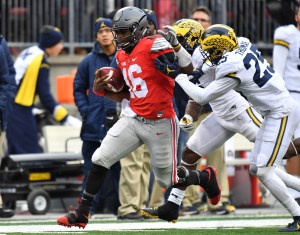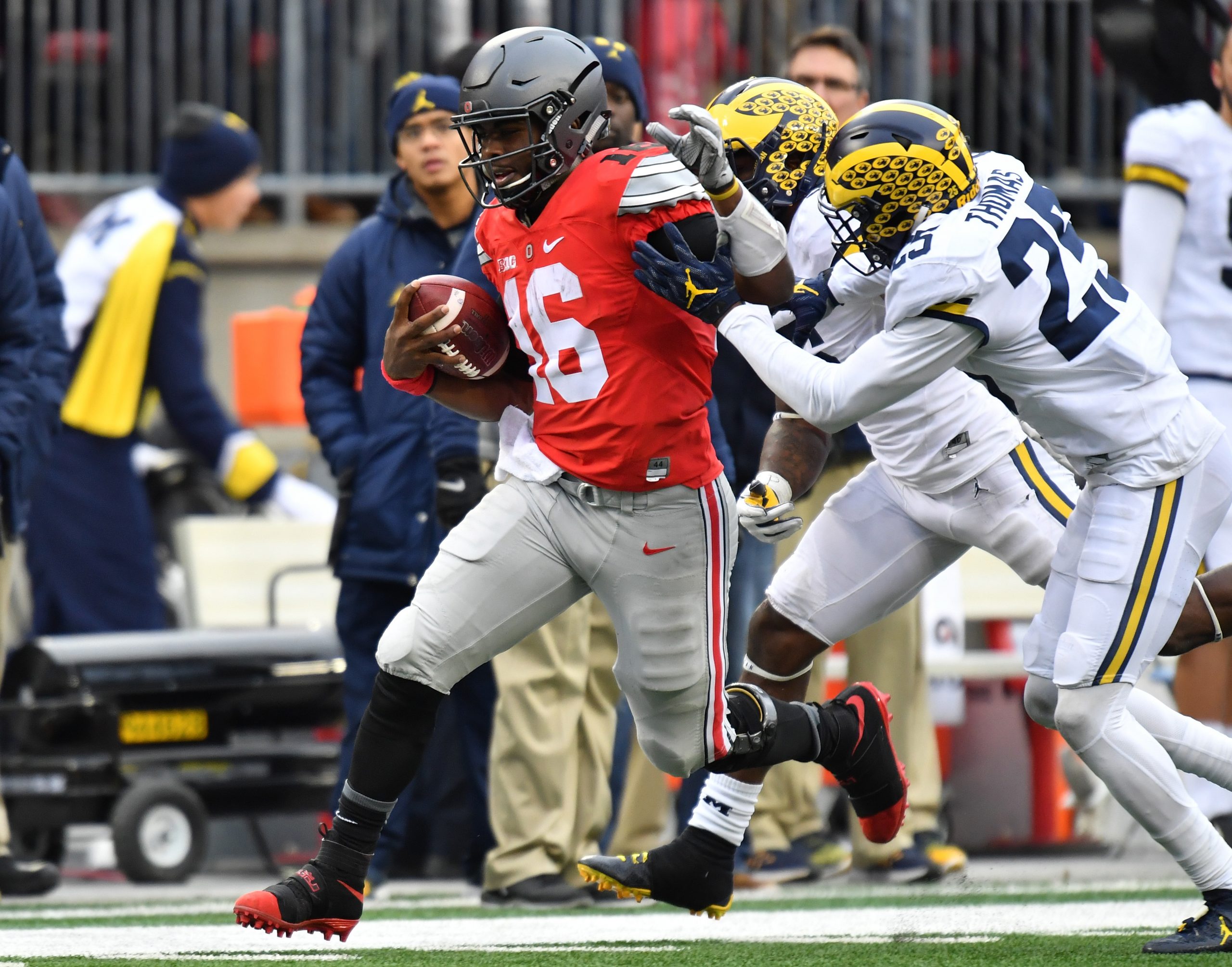
Oregon is not Alabama or Ohio State, and never will be.
In fact, Oregon isn’t even Oregon anymore.
Mike Bellotti, Phil Knight and Chip Kelly created a perfect synergy just as the PAC-12 was formed. The Ducks had been building a juggernaut over 20 years, winning a race for innovation in several ways.
They led the country with innovative style, becoming known for fancy uniforms and breaking with tradition.
Between 1995 and 2013. Knight built them an indoor practice facility, an academic center, and the Hatfield-Dowlin Complex, a total investment of over $100 million in football infrastructure, to which they’ve added the Marcus Mariota Center for student-athlete health and sports performance, $19.2 million.
On the field, the Ducks were among the first to adopt the up-tempo spread, an offense that left opponents gasping for air once UO perfected it with Kelly as coordinator.
When he took over as head coach in 2009, he inherited a PAC-12 Conference that was ripe for plundering.
Washington and Washington State were reeling from a series of bad coaching hires. UCLA was miserable after the nightmare tenure of Karl Dorrell. Stanford was just recovering from the damage caused by Tyrone Willingham and Walt Curtis. USC reeled from sanctions and the loss of Pete Carroll. Cal was in disarray. Utah and Colorado hadn’t yet found their footing as new conference members and suffered from a huge talent gap. The Arizona schools were both underfunded and undercoached.
Kelly reigned in this mess. He quipped with Erin Andrews and gave clipped answers to the press. He ducked out of booster meetings, went for it on fourth down, went for two after touchdowns. His fleet-footed backs and well-tutored quarterbacks dished up yards and points like brimming ladles of holiday gravy.
It was a heady, marvelous time. The Ducks went to two national championships, won or shared four PAC-12 titles and at one point, won 12 games three seasons in a row.
A lot has happened since. Mark Helfrich happened, bringing on a steady erosion of the culture and innovation. Discipline, accountability and commitment slipped. The conference secured a lucrative television deal. Other schools built state of the art facilities and hired topnotch coaches.
There was an infusion of coaching talent into the PAC-12 with Chris Petersen taking over at Washington, Mike Leach at WSU, Rich Rodriguez and Todd Graham at the Arizona schools. USC survived their sanction period while still enjoying a surging pipeline of Southern California athletic talent. Mike McIntyre turned things around at Colorado. Sonny Dykes brought his own brand of innovation to the Cal Bears and made them a dangerous opponent again. UCLA hired Jim Mora, a tough-minded coach who taken an NFL team all the way to a conference title game. Kyle Whittingham built the Utes into an aggressive team with a raucous home field advantage.
Down on The Farm, first Jim Harbaugh and then David Shaw transformed the culture, making soft, intellectual Stanford an imposing rival built on Smashmouth football, a physical running game, mammoth, agile offensive linemen and hard-hitting defense.
The advantages Kelly exploited no longer exist. Everybody has uniforms. Army and Navy are lining up in fresh duds today. All the conference schools have a gleaming weight room and an impressive locker room. The entire conference is well-coached and well-funded. The conference is a gauntlet in 2017.
Oregon’s spread attack and up-tempo pace are now widely copied, and teams all over the country are playing and winning with new versions of it. The Air Raid. The Smashmouth Spread. Run-pass options. The Baylor attack, which Willie Taggart adopted at South Florida.
Teams adapted to pace, practice at tempo, and face it week after week. It’s no longer the problem, the schematic advantage it was in 2009 and 2010.
Willie Taggart inherits a team that has gone stale, 4-8 in 2016. The players no longer prepare or practice to the same standard. There are divisions in the locker room between veteran players and the young ones. Entitlement crept in.
Recruiting misses, transfers, injuries and attrition eroded the talent base. Helfrich waffled and mumbled as a head coach, and people lost confidence in him. This year the Ducks lost three games by a field goal and four others in blowouts, ending the season by squandering a 10-point third quarter lead in the Civil War. Rob Mullens had seen enough, no longer confident that the leadership and continuity that built Oregon’s impressive run existed. He dismantled the staff, and agreed to a buyout with an Oregon native who’d coached the team to a national championship game just two years ago.
That’s what Willie Taggart inherits. In his first three days on the job he’s kept to a promise he made at his introductory press conference, “Recruiting, Recruiting, Recruiting.”
Taggart’s flown to Hawaii to meet Alabama quarterback commit Tua Tagovailoa and Oregon commit at kicker/punter Adam Stack. He’s offered two defensive ends from Florida, speedy tailbacks from Washington and California. He’s reconnected with Duck decommit Deommodore Lenoir, the #3 athlete in the country, a playmaking cornerback. He made an unsuccessful pitch to Elijah Molden, the best high school prospect in the state, firmly committed to Petersen at UW.
The coach is tireless and relentless. He exudes positive energy and readily connects with young athletes. He oversaw successful rebuilding jobs at two Group of Five schools. At 40, he has the drive and charisma to provide a sharp contrast to his predecessor. Taggart takes ownership of a room, a microphone, a podium. He has an infectious smile. You feel like he’s in command, that he has a plan. That’s incredibly promising after four seasons of stuttering and dry, detached humor.
When Taggart met the Oregon media Wednesday he said he would lead with three simple principles.
No excuses.
Blame no one.
Do something.
That’s a marvelous beginning for the reboot of the Oregon Ducks. He’s already proven true to that mantra, working rapidly to build some recruiting momentum, interviewing some promising candidates for defensive coordinator. Charlie Strong has been mentioned–Strong floundered as head coach at Texas, but before that he was a stalwart DC at Florida and a highly successful head coach at Louisville.
Mullens has given Willie T. four million to spend on assistants. The Ducks will assemble a terrific staff infused with fresh blood and new energy, committed to finding the 25 best football players they can find for the 2017 class, eager to begin coaching and improving the holdovers, who will have to adjust to a new standard of work.
No one is guaranteed a job. Everyone will have to compete. It’s no longer enough to just put on that dazzling array of uniforms. It never was.
Taggart will make the Ducks earn everything, and that’s incredibly refreshing. He’s said openly that he wants to be the first African-American coach to win a national championship. He’s stated that Oregon has all the resources they need to achieve that goal.
The most vital resource is talented players, and he’s made it his job one to find them, recruiting from Florida to Hawaii in his first three days in the green and yellow.
As fans we’re partly to blame for the demise and the fall of Oregon football. To quote a saccharine football movie, “We got lost, caught up in the hype, the glory and the relentless pressure. That’s not who we are.”
The fanbase grew entitled. Fans wouldn’t take their seats until five minutes into the first quarter. They scrambled back to the tailgate before halftime, and didn’t return until a possession or two elapsed in the third. They deserted just after the start of the fourth.
We were bloated with success and expected it. 10,11 wins a year, easy. Plug and play at quarterback. We took opponents for granted. We were okay with sloppy starts, poor discipline, bad tackling, a 31-point collapse in a bowl.
We should have had more engagement, and realistic expectations. We became lazy and entitled, comfortable with a mediocre effort and team that swaggered but hadn’t earned the right to do so.
Willie Taggart wants to make us all better. He’ll demand more from the players and reward those who show the effort and commitment to reach their potential. He has vowed his Ducks will play an exciting brand of football and they’ll graduate and conduct themselves responsibly in the community.
This season Oregon lost three games by a field goal in their first seven, and the season would have had an entirely different feel if they’d been a field goal better in those games. They quit versus Washington, USC and Stanford. They were outwilled by the Beavers, who ran the ball 23 straight times to seal the game.
I like the Taggart hire because I believe he will transform Oregon’s culture and improve their focus. That’s the most sustainable edge from the Chip Kelly years. He’ll scour the country looking for athletes who fit his culture, players who have the fire and commitment to expect great things from themselves.
There will be a new energy coming out of the tunnel. These players will earn their swagger, or the coach will play someone else.
That’s refreshing, but it may not translate to wins right away. The coach and his staff have to cut out entitlement, laziness, and complacency. They have to find and develop some talent for the defensive front seven. They have to implement new systems.
I believe Oregon will play harder in 2017 and the quality of effort will be dramatically better. An early road game to Wyoming will be a telling test–Craig Bohl has transformed that culture and the Cowboys will be primed to take on Oregon. The two schools couldn’t be more different in their their reputation and philosophy. Bohl had his team in the conference championship this season at 8-5; they’ll face BYU in the Poinsettia Bowl on December 21st while the Ducks stay home for the first time in 11 years.
It’s tough to transform a 4-8 team. Taggart’s first year will be a work in progress, and 7-8 wins would constitute at a good season.
What’s more important initially is the quality of effort and the commitment to improvement. Fewer stupid penalties. Better tackling. A team that executes and plays hard for four quarters, starting faster, coming out of halftime with more focus, with better internal leadership and a refusal to quit.
Going forward, the Ducks ought to be competitive most years and a factor in the conference race. They should regularly go bowls. They should play hard and be entertaining.
And when Taggart and his staff have assembled their kind of players and have the right mix of talent and senior leadership, they should have a special year where they can win playoff games and be among the nation’s elite. Not every year. Not right away. But that’s the goal and the heart of the process, doing things the right way and building toward something.
I believe Oregon made an excellent hire, and Duck football will be exciting again, something to be hopeful about. I intend to have a good day today, enjoying the beginning of this new chapter of the Oregon story.
Add The Sports Daily to your Google News Feed!
